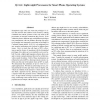Free Online Productivity Tools
i2Speak
i2Symbol
i2OCR
iTex2Img
iWeb2Print
iWeb2Shot
i2Type
iPdf2Split
iPdf2Merge
i2Bopomofo
i2Arabic
i2Style
i2Image
i2PDF
iLatex2Rtf
Sci2ools
129
click to vote
CORR
2011
Springer
2011
Springer
Quire: Lightweight Provenance for Smart Phone Operating Systems
Smartphone apps often run with full privileges to access the network and sensitive local resources, making it difficult for remote systems to have any trust in the provenance of network connections they receive. Even within the phone, different apps with different privileges can communicate with one another, allowing one app to trick another into improperly exercising its privileges (a Confused Deputy attack). In QUIRE, we engineered two new security mechanisms into Android to address these issues. First, we track the call chain of IPCs, allowing an app the choice of operating with the diminished privileges of its callers or to act explicitly on its own behalf. Second, a lightweight signature scheme allows any app to create a signed statement that can be verified anywhere inside the phone. Both of these mechanisms are reflected in network RPCs, allowing remote systems visibility into the state of the phone when an RPC is made. We demonstrate the usefulness of QUIRE with two example...
| Added | 13 May 2011 |
| Updated | 13 May 2011 |
| Type | Journal |
| Year | 2011 |
| Where | CORR |
| Authors | Michael Dietz, Shashi Shekhar, Yuliy Pisetsky, Anhei Shu, Dan S. Wallach |
Comments (0)

